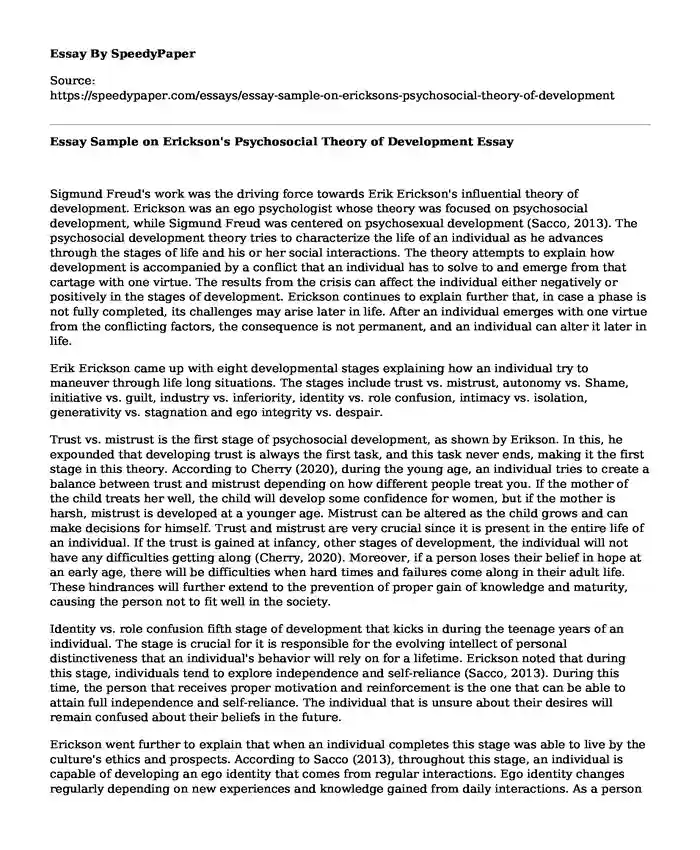
| Type of paper: | Essay |
| Categories: | Developmental psychology Cognitive development Lifespan development Moral development |
| Pages: | 3 |
| Wordcount: | 743 words |
Sigmund Freud's work was the driving force towards Erik Erickson's influential theory of development. Erickson was an ego psychologist whose theory was focused on psychosocial development, while Sigmund Freud was centered on psychosexual development (Sacco, 2013). The psychosocial development theory tries to characterize the life of an individual as he advances through the stages of life and his or her social interactions. The theory attempts to explain how development is accompanied by a conflict that an individual has to solve to and emerge from that cartage with one virtue. The results from the crisis can affect the individual either negatively or positively in the stages of development. Erickson continues to explain further that, in case a phase is not fully completed, its challenges may arise later in life. After an individual emerges with one virtue from the conflicting factors, the consequence is not permanent, and an individual can alter it later in life.
Erik Erickson came up with eight developmental stages explaining how an individual try to maneuver through life long situations. The stages include trust vs. mistrust, autonomy vs. Shame, initiative vs. guilt, industry vs. inferiority, identity vs. role confusion, intimacy vs. isolation, generativity vs. stagnation and ego integrity vs. despair.
Trust vs. mistrust is the first stage of psychosocial development, as shown by Erikson. In this, he expounded that developing trust is always the first task, and this task never ends, making it the first stage in this theory. According to Cherry (2020), during the young age, an individual tries to create a balance between trust and mistrust depending on how different people treat you. If the mother of the child treats her well, the child will develop some confidence for women, but if the mother is harsh, mistrust is developed at a younger age. Mistrust can be altered as the child grows and can make decisions for himself. Trust and mistrust are very crucial since it is present in the entire life of an individual. If the trust is gained at infancy, other stages of development, the individual will not have any difficulties getting along (Cherry, 2020). Moreover, if a person loses their belief in hope at an early age, there will be difficulties when hard times and failures come along in their adult life. These hindrances will further extend to the prevention of proper gain of knowledge and maturity, causing the person not to fit well in the society.
Identity vs. role confusion fifth stage of development that kicks in during the teenage years of an individual. The stage is crucial for it is responsible for the evolving intellect of personal distinctiveness that an individual's behavior will rely on for a lifetime. Erickson noted that during this stage, individuals tend to explore independence and self-reliance (Sacco, 2013). During this time, the person that receives proper motivation and reinforcement is the one that can be able to attain full independence and self-reliance. The individual that is unsure about their desires will remain confused about their beliefs in the future.
Erickson went further to explain that when an individual completes this stage was able to live by the culture's ethics and prospects. According to Sacco (2013), throughout this stage, an individual is capable of developing an ego identity that comes from regular interactions. Ego identity changes regularly depending on new experiences and knowledge gained from daily interactions. As a person acquires new skills and knowledge, he is obliged to take challenges that, in one way, can challenge or help in full attainment of identity (Sacco, 2013). Confusion is brought by the failure to attain identity in this period of growth. When the status is not acquired, confusion kicks in and can take longer to get rid of it in the future.
All the stages of Erik Erickson's theory of development are interdependent of each other. You cannot skip a single phase of life for it will come up in the future and cause massive problems. Through the development theory, early stages and middle stages of development have gained interest as people only focused on the late stages of development. The theory is entirely focused on individual experiences and how they affect the growth of an individual and the behavior to acquire after every interaction.
References
Cherry, K. (2020). Understanding Erikson's Stages of psychosocial development. Retrieved 9 April 2020, from https://www.verywellmind.com/erik-eriksons-stages-of-psychosocial-development-2795740
Sacco, R. (2013). Re-Envisaging the eight developmental stages of Erik Erikson: The Fibonacci Life-Chart Method (FLCM). Journal of Educational and Developmental Psychology, 3(1). doi: 10.5539/jedp.v3n1p140
Cite this page
Essay Sample on Erickson's Psychosocial Theory of Development. (2023, May 14). Retrieved from https://speedypaper.net/essays/essay-sample-on-ericksons-psychosocial-theory-of-development
Request Removal
If you are the original author of this essay and no longer wish to have it published on the SpeedyPaper website, please click below to request its removal:
- Shame and I Became Her Target - Essays Analysis Example
- Essay Example on Tough Guise 2 by Jackson Katz
- Essay Example on Self-Sacrifice in Love in Casablanca
- Essay Sample on Influence of Politics and Power
- A Parasocial Relationships - Paper Example
- Navigating Stress: A Case Study Sample on Causes, Management, and Therapeutic Approaches
- Modes of Interaction in Relationships - Essay Sample
Popular categories




